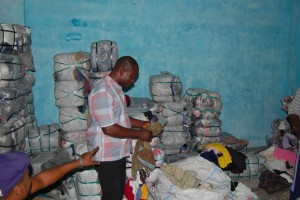A brand new car has a wonderful feel about it – the drive, scent, satisfaction and self-assurance it gives the driver and passengers is unmatched. Unfortunately, except for government officials, politicians and the one percent of Nigerians that can afford new cars, few Nigerians will ever experience the pleasure of a new car.
Instead, most Nigerian families depend on vehicles that have practically outlived their useful life spans in Europe and America. Thus, a 15-year-old vehicle with over 200,000 miles and a warranty that ran out a decade ago is something to cheer for most Nigerian car buyers. Vehicles from junkyards or better off as scrap metal are scavenged and sold to hapless Nigerians for hundreds of thousands or even millions of naira.
The fad for second-hand goods is not limited to automobiles or consumer goods, nor to individuals; government also buys used products. Thus, military equipment, naval ships, civil and military aircrafts, train engines and coaches, medical equipment and security and communications gadgets – not to talk of generators – are all procured from flea markets around the world. A former president even tried to buy a used plane.
It is no wonder that Nigerian military armoured vehicles regularly broke down during peace-keeping missions. The constant spate of plane crashes is certainly not unconnected with the age of the planes and ‘Belgium’ replacement parts. The federal government once signed a $500 million contract with China for the supply of used locomotives. From every point, we seem to be drowning in the armada of used goods.
Perhaps to deflect the unsavory irony of depending on other people’s used consumer electronics like televisions, radios, computers, shoes, books, shirts, trousers, socks, brassieres and underpants, Nigerians have jocularly advanced names like ‘fairly used’, ‘second-new’, ‘bend-down-boutique’, ‘Belgium’. They all mean the same: used and discarded elsewhere – but very popular in Nigeria.
Many schools and libraries now depend on used books flushed out of homes and libraries in other parts of the world – sometimes along with outdated teachings and concepts. Many primary and secondary school students depend on shoes and bags used and discarded years ago in other lands. Even that bastion of trendiness – university campuses – mostly have to do with used jeans, old designer shirts, dresses and sneakers all sourced from ‘bend-down-boutiques’.
More often than not, Nigerians do not realise the dangers in buying used products: Quite a number of vehicles sold as ‘tokunbo’ have been involved in accidents or have structural and safety problems. There is also a danger of bringing radioactive substances into our homes and offices when we buy used consumer electronics, some of which have been banned elsewhere. Dire economic circumstances leave people with little choice.
The point must be made that there is nothing wrong with living within one’s means, or using used items. But is this what Nigerians deserve? How did we get to this sorry state? How did we become a second-hand nation, a dumping ground for goods intended for the scrap yard? How come a country that earns over $30 billion annually has to depend on ‘second new’ products for our military and ‘bend-down-boutiques’ to clothe our people?
What is the story of manufacturing in Nigeria?
A year before Independence in 1959, data suggests that the manufacturing sector contributed about 4.4 percent of Nigeria’s GDP. A decade later in 1970, it had risen to 9.4 percent. Another decade later in 1981, it was 11.4 percent. However, three decades later in 2011, manufacturing contributed only about 4% of Nigeria’s GDP.
To put these statistics in perspective, Nigeria’s manufacturing sector actually contributes less to Nigeria’s economy today than it did 50 years ago. Now, thousands of local manufacturing companies are closing. According to the Manufacturing Association of Nigeria, MAN, over 820 manufacturing companies shut down their operations in Nigeria between 2000 and 2008. More have closed down since then.
What caused the decline of our industries and consequent dependence on used products?
It is easy to point to the challenges of poor infrastructural facilities, especially electric power, water supply, transport and telecommunications. It is easy to point to rising population and the low costs of imports. It is easy to point to our tastes for foreign goods, even if used. The truth of the matter is that our trade policies have made Nigeria a dumping ground for all kinds of products, new, used or even toxic.
Why else would President Goodluck Jonathan approve a N70 billion intervention fund to help revive Nigerian textiles, then three days later, also approve a memo that eases the importation of cheap Indian and Chinese prints? Much capital has been made from Jonathan’s PhD. The question is, does he understand what he signs?
To halt the second-hand good invasion, import of certain categories of used items must be banned and policies to ease local manufacturing activity encouraged. Infrastructural development is critical. Arbitrary import bans and restrictions, often imposed and lifted with little regard for overall impact on the domestic economy must be stopped.

